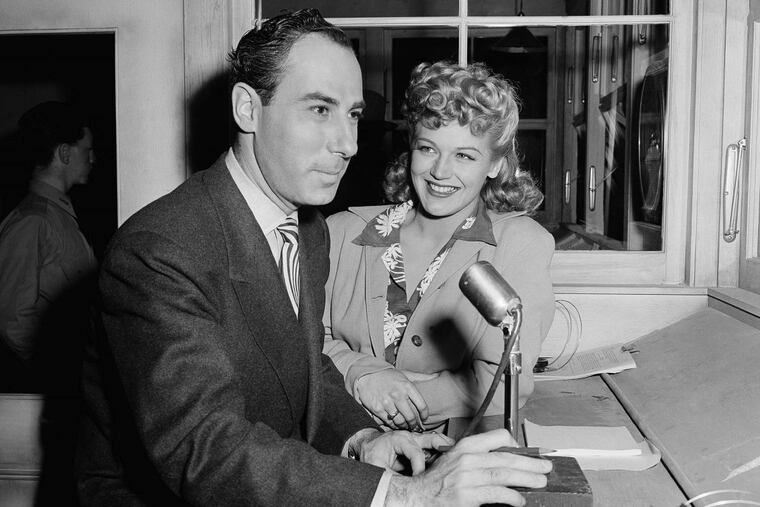A sportscaster who specialized in fantasy | Frank's Place
Search for Stern on YouTube, and you'll find more fairy tales.

Long before social bots, Alex Jones, and Macedonian misdirection, there was Bill Stern, history's most aptly initialed sportscaster.
My father loved Stern, though his stories about him always included a caution about the drug addiction his favorite broadcaster developed following a serious car accident.
But until a recent satellite-radio scan paused on an old show the Radio Classics channel was re-airing, I'd never heard any of the broadcasts that made Stern rich and notorious.
Born in 1907 in Rochester, N.Y., he had been booted from several prep schools when his desperate parents sent him to Pennsylvania Military College (now Widener) in 1925.
Stern found an equilibrium in the discipline at the Delaware County school, lettering in basketball, football, and polo; forming a jazz band; and tinkering with the new medium of radio.
"I came there a young punk," Stern would say, "and left a man."
Following graduation in 1930, he worked in vaudeville and theater before hooking up with sportscasting pioneer Graham McNamee. Soon Stern was doing games solo. Edgy and bombastic, he was an early version of Howard Cosell. As with Cosell, his popularity exploded and NBC awarded him a weekly show.
Bill Stern's Colgate Sports Newsreel, which ran from 1937 to 1956, was, according to one radio historian, "one of the most successful and most listened to shows in radio history."
As the name implied, it was intended to impart sports news. But Stern clearly preferred entertainment. Spurning traditional sports news, he and the 15-minute weekly show's writers instead concocted corny, outrageous mythologies about America's athletic heroes.
When Stern died in 1971, a New York Times obituary called him a purveyor of "flamboyant anecdotes". Others weren't as kind.
The falsehoods often presented as facts outraged his journalistic colleagues. "He didn't know much about sports," said Ernie Harwell, "but the lack of knowledge didn't faze him."
Stern dismissed the criticism. "I'm laughing all the way to the bank," he once said.
According to a 2008 article by Jack French on the Radio Recall website, "there was no limit to Stern's audacity in creating these phony stories. … Instead of the inside dope, his listeners got a steady dose of stories well outside the boundaries of truth and reason."
On an early broadcast, Stern, to an organ's dramatic accompaniment, recounted a thoroughly fictitious encounter between Abraham Lincoln and Gen. Abner Doubleday – the debunked inventor of baseball — on the 1865 night the president was mortally wounded.
Dying from a bullet wound to the head in a boarding-house bed across from Ford's Theater, Lincoln, according to the broadcaster, managed to summon Doubleday to his side.
"Keep baseball alive," the expiring leader whispered. "In the trying days ahead, the country will need it." Lincoln then lowered his head into the bloody pillow and died.
Questions about the narrative flowed into NBC, which ordered Stern either to report the news or provide a disclaimer.
To comply, at the opening of each subsequent show, the sportscaster uttered an ambiguous warning about the subject matter:
"Some are legends. Some are mere hearsay. But all are so interesting we would like to pass them along to you."
Search for Stern on YouTube and you'll find more fairy tales. Even by the disappearing standards of our clickbait century, they seem astonishingly extreme.
Bet you didn't know, for example, that inventor Thomas Edison's deafness was the result of his being beaned in a baseball game.
"And the pitcher was," Stern intoned breathlessly before pausing, "Jesse James!"
In 1946, Stern told the story of millionaire Harry Oakes. Decades earlier Oakes had been a hobo. De-training in Baltimore, he found a $1 bill. About to use it for food, he remembered hearing about a local orphan who pined for a baseball bat.
Oakes bought the bat for the youngster and soon left town on a journey that led to his discovery of an untapped Canadian gold mine.
"And that young orphan's name was … Babe Ruth!"
Stern aired stories about a champion swimmer with no arms or legs and one that claimed Giants pitcher Christy Mathewson had inspired George Gershwin's "Rhapsody in Blue."
And at the end of a tale about a priest who had persuaded a discouraged Frankie Frisch to return to baseball, Stern asked his writers to identify the priest as the future Pope Pius XI, even though the pontiff had never visited America.
Stern was somewhat less controversial calling live events. He did the first televised football and baseball games in 1939 and was a regular for big-time horse races and college-football matchups.
But once at Notre Dame, Stern breathlessly described an Irish TD run. Unfortunately, as the ballcarrier neared the goal line, he realized he'd misidentified him. No problem. He invented a last-second lateral.
In the Newsreel episode I stumbled upon, Stern related, in overheated terms, how famed sportswriter Grantland Rice had altered entertainment history while covering a New Jersey fight card in the late 1930s.
Rice, according to Stern's fiction, was in the locker room waiting to interview a boxer who'd been knocked out. The writer heard the young man singing in an adjacent shower and was so impressed, he advised him to give up the ring and become a crooner.
"And that young boxer's name, ladies and gentlemen, was … Frank Sinatra!"
Why my father was bewitched, bothered, and bewildered by this charlatan, I still don't understand.
I guess if you were a kid and a fan in the bleak 1930s, you were grateful for whatever sports news you could get.
In 2017, we're much more savvy. We'd never fall for fake news.